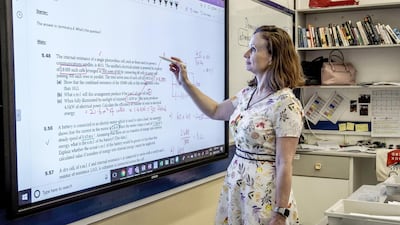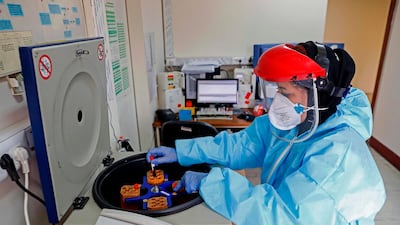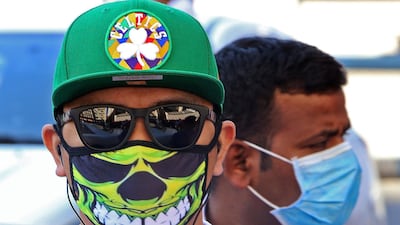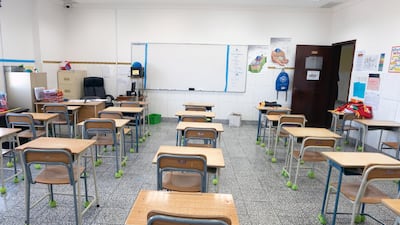Latest: Here's what home learning looks like for UAE pupils
Schools and universities across the country will close for a month from Sunday as part of efforts to contain the spread of coronavirus, the Ministry of Education said on Tuesday night.
Spring break, which was due to begin on March 29, will instead begin on March 8 and last two weeks. Distance learning will be introduced during the remaining two weeks, with pupils learning from home.
Government schools will run a home-teaching programme called Learn from Afar from March 22 to April 5. It was due to be tested on Wednesday and Thursday.
Private schools were urged to set up their own distance-learning programmes or expand existing e-learning tools such as Google Classroom, ClassDojo and Seesaw, to cover the school day.
A "sterilisation programme" for all educational facilities will be carried out in all schools, buses and universities, the ministry said.
In other developments:
- Mosques and Quran centres will be sterilised as part of efforts to safeguard public health, the General Authority of Islamic Affairs and Endowments (Awqaf) said on Wednesday.
- Six new cases of coronavirus were confirmed on Tuesday, bringing the country's total to 27. The patients were two Russians, two Italians, one German and one Colombian connected to the two Italian cycling team members on the UAE Tour who tested positive. Hundreds of cyclists, support team staff and journalists quarantined in two hotels on Yas Island were cleared and returned home.
- The Department of Health Abu Dhabi cancelled its international treatment programme that sends Emiratis with complex medical issues abroad for treatment to "limit the risk of contagion".
- Sheikh Mohamed bin Zayed, Crown Prince of Abu Dhabi and Deputy Supreme Commander of the Armed Forces, spoke with Italian Prime Minister Giuseppe Conte in a phone call and expressed "solidarity with Italy in countering the spread of coronavirus", state news agency Wam said. He was briefed by Mr Conte about the efforts there to contain and control the virus.
Education officials said schools should prepare staff and pupils and asked parents to ensure their children are technically equipped to take part in distance learning.
Pupils need a space to study, computers, tablets or smartphones and a good internet connection. Some e-learning systems have video or voice chat to allow pupils to talk to teachers.
Teachers and pupils can email sd@moe.ae for technical support.
Speaking before the ministry's announcement, Gavin Walford-Wright, head of marketing and admissions at Taaleem, which runs 10 private schools in Dubai, said the group began expanding its existing home teaching system last week.
The system includes live streaming to allow teachers to talk to children.
"We started stress testing the school network to make sure the bandwidth worked and could cope with the demand of simultaneous live streaming," he said.
"We set up classrooms with an external connection so pupils could connect with teachers in a virtual classroom. The trial run went smoothly."
He said the main challenge is ensuring the internet connection is strong enough to allow the classes to continue uninterrupted.
"The only other issue we could foresee with the full virtual experience is how to get materials to children in advance and keep them engaged," he said.
Kamal Kalwani, chief executive of school operator Ambassador Education, said the group would expand its use of Google Classroom and Microsoft Teams, which it uses to share documents and videos with pupils.
"With the current development, we will be increasing the number of topics and videos we cover in our bank,” he said.
He said classes and tasks would run throughout the day.
"Most of our pupils have their devices at home and they will be using their computer and iPads."
Speaking on Wednesday, working parents in the Emirates said employers needed to allow parents the flexibility of working from home given school closures.
Rizwana Tahiri, the mother of a five-year-old, said not all parents would be in a position to book carers to look after their children at short notice.
She also warned, however, that working from home was not necessarily a convenient solution for everyone, given the inevitable distraction of having children in the house.
"If schools are closed, organisations need to take stand and give a mandate that parents can work at home unless they are required in the office for urgent work," she said.
"There is no one at home to take care of my son, and if I have a client meeting I may have to rely on help from relatives or friends.
"When children are at home, you cannot concentrate on work they way you would be able to at the office."
Clementina Kongslund, 42, a Romanian mother-of-two living in Dubai, said she faced having to take her children to work.
"I have a nanny but she will go on holiday next week, so I don't know how I will manage," she said.
"The problem is that schools want to use online learning which is okay, but who will supervise the children? A lot of mothers do not have anyone to help at home."
Charles Haworth, a regional executive at GE Renewable Energy, a division of American multinational General Electric, said the company was monitoring coronavirus developments closely.
"We have systems to allow working from home, where appropriate," he told The National. "We would deal with individuals in the organisation on a case-by-case basis.
“Our leadership are meeting regularly to discuss the impact of coronavirus in different regions."

















